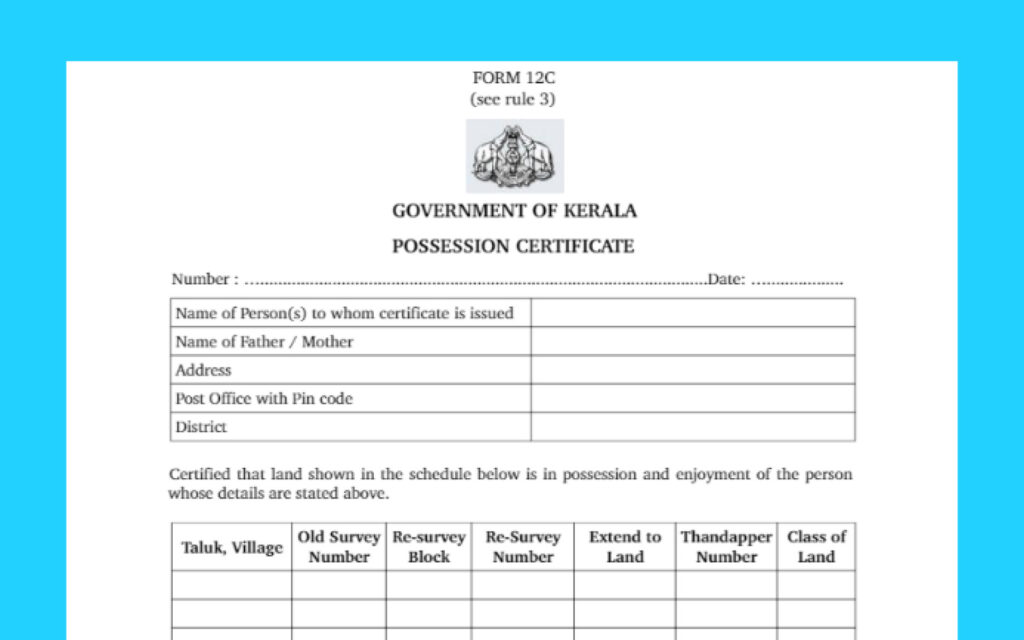The Possession letter is one of the key documents that a property seller hands over to the property buyer. The possession certificate in India is usually given by the Tehsildar (in rural areas) and Revenue Divisional Officer (in urban areas). The buyer can use this certificate to secure a loan from financial securities too.
A possession certificate is proof that the property has been transferred without any illegal, illicit activities. But to confirm that an individual is the owner of the property he should have an occupancy certificate too.
The possession certificate in India is issued by local authorities stating that the property has been constructed as per the laws and the construction has been completed as per the plan that is approved. The possession certificate is a document to affirm the ownership of the property. In case of failure to get the certificate, can make the property illegal in front of the local authorities.

What is a possession certificate?
A possession certificate serves as proof, given by the property’s seller to the buyer, signifying the transfer of possession. This certificate isn’t just a mere document; it holds significant weight, especially when you are considering financing options. Planning to get a home loan from a bank? The possession certificate plays a pivotal role in that process.
Now, where you obtain this certificate depends on where you reside. If your home is in a rural expanse, expect the Tehsildar to provide you with the possession certificate. However, for those living in the urban regions, your go-to authority for this document will be the Revenue Divisional Officer (RDO).
Particulars of the possession certificate
The possession certificate includes information regarding the description of the property and the required add-ons like the parking, garage, etc. as agreed upon in the contract. The possession certificate should be authentic and include the date of the possession of the property.
When a home buyer receives the possession certificate but finds discrepancies in the property’s condition or maintenance, they can issue what is known as a conditional possession certificate. This certificate is often used when the property has issues like incomplete construction or damages, or when certain changes agreed upon initially are not incorporated.
A conditional possession certificate lets the buyer set specific conditions for taking possession of the property. However, if the builder or property owner does not adhere to the terms outlined in this certificate, there can be complications. It is crucial to ensure all terms are met to maintain a smooth transaction.
What is an occupancy certificate?
An occupancy certificate, often abbreviated as OC, is a critical document issued by local municipal authorities. This certificate signifies that a newly constructed building adheres to the set building codes, and standards, and is fit for habitation. Essentially, it confirms that the building is constructed as per the approved plans and meets all the necessary infrastructural and safety norms.
For a property buyer, securing an occupancy certificate is of paramount importance. It not only validates the legal status of your property but also ensures that utilities like water, electricity, and sewage systems are in place and functional. Without an OC, living on the property can be deemed illegal, and utilities might be disconnected. So, from a financial and legal standpoint, before making that final property transaction, always ensure the availability of a genuine occupancy certificate.
Possession certificate vs occupancy certificate
When dealing with real estate, it is essential to understand the difference between a possession certificate and an occupancy certificate. While a possession certificate denotes the property’s completion date, an occupancy certificate is a green signal from local authorities that the property is fit for residence. The latter provides you with the official right to occupy the property, a guarantee not offered by the possession certificate.
Documents required to obtain a possession certificate
- Copy of the registered lease and the sale deed agreement
- Ration Card
- Copy of the encumbrance Certificate
- Id proof of the applicant.
How to obtain a possession Certificate?
- Visit the nearest Anchaladhikari office for procuring the application form. The form can be downloaded from the Revenue and Land Reforms website of the respective state.
- Fill the application form with the details that are required.
- Attach the relevant documents and submit them with the form of the concerned office.
- Once the documents are submitted the applicant will receive an acknowledgment receipt. The receipt will have an application number that can be used for further reference.
FAQs
What is a Possession Certificate?
A Possession Certificate is an official document issued by a legal authority or the seller of a property that certifies that the possession of a property has been transferred from the seller to the buyer.
Why do I need a Possession Certificate?
A Possession Certificate is essential for establishing legal ownership of a property. It is required for various legal processes, such as property registration, obtaining a home loan, and for municipal or government records.